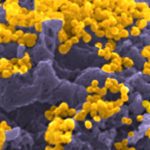Link to Pubmed [PMID] – 39243760
Link to DOI – 10.1016/j.chom.2024.08.010
Cell Host Microbe 2024 Oct; 32(10): 1787-1804.e9
The role of immunoglobulins produced by IL-10-producing regulatory B cells remains unknown. We found that a particular newborn regulatory B cell population (nBreg) negatively regulates the production of immunoglobulin M (IgM) via IL-10 in an autocrine manner, limiting the intensity of the polyreactive antibody response following innate activation. Based on nBreg scRNA-seq signature, we identify these cells and their repertoire in fetal and neonatal intestinal tissues. By characterizing 205 monoclonal antibodies cloned from intestinal nBreg, we show that newborn germline-encoded antibodies display reactivity against bacteria representing six different phyla of the early microbiota. nBreg-derived antibodies can influence the diversity and the cooperation between members of early microbial communities, at least in part by modulating energy metabolism. These results collectively suggest that nBreg populations help facilitate early-life microbiome establishment and shed light on the paradoxical activities of regulatory B cells in early life.


